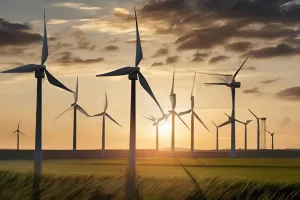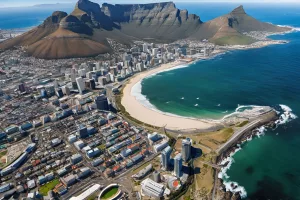Minister Patricia de Lille spoke at Meetings Africa, a PanAfrican platform showcasing the potential of the African business events sector. The event had exhibitors from 21 African nations and highlighted sustainability. South Africa’s tourism industry has grown significantly, with a 48.9% increase in international tourist arrivals from January to December 2023. The event celebrated the transformative power of freedom and the continent’s capacity to host major international events.
FlySafair’s Innovative Approach: Championing Local Art and Revolutionizing Air Travel
FlySafair is changing air travel by showcasing local South African artists’ skills on their planes, creating a unique and uplifting atmosphere. The airline’s dedication to promoting local talent and integrating it into their business strategy provides a model for other companies to follow. This innovative approach transforms the passenger experience, connecting the airline, its passengers, and the artists, while contributing to the community and redefining inflight experiences. FlySafair’s campaign harnesses the power of art to create an inspiring and hopeful future for the airline industry.
The Lenox guesthouse in Cape Town’s Gardens district is undergoing a transformation into a boutique hotel and artist residency by French organization MEMORIST. The project aims to host up to nine artists from South Africa, Africa, and France, providing an arena for artistic creation and showcase, and a cultural immersion experience for its visitors. Newmark will manage the Lenox as an artcentric boutique hotel, with communal spaces invigorated by the artwork of inresidence artists, offering guests a distinctive blend of art and hospitality. The project is set to welcome the public in 2026.
The Cultural and Creative Industry Awards (CCIA) is a prestigious celebration of South African arts, culture, and heritage, aimed at recognizing exceptional talent and promoting development and expansion of the creative sector. The selection process is designed for fairness and credibility, involving industry experts and auditing firms. The CCIA signifies the flourishing arts and culture sector in South Africa, with a crucial role in nationbuilding and promoting social cohesion. The launch of the CCIA promises to elevate the stature of South African creatives and the country’s cultural heritage on the global stage.
Beyoncé launched her hair care line, CÉCRED, with a glamorous event in Downtown LA. The line aims to promote diversity and celebrate the beauty of various hair types while paying homage to hair rituals worldwide. Beyoncé’s fashion sense and business acumen were on full display at the launch event, showcasing her lasting impact and pioneering spirit. CÉCRED is not just a hair care line but a tribute to the versatility and dynamism of the iconic pop artist.
Cape Town is facing a significant reduction of R540 million in funding over the next two years due to nationwide cuts announced by Finance Minister Enoch Godongwana. The decision threatens to disrupt the operational budget and resources devoted to housing, basic services, and upgrading informal settlements. Despite these challenges, Cape Town remains committed to advocating for the preservation of vital grant funding and a larger equitable share of national funding. Mayor HillLewis criticized the national government’s decision and proposed exploring other options such as reducing wastage in national departments or trimming VIP security expenses.
Dr. Naledi Pandor, South Africa’s Minister of International Relations and Cooperation, highlighted the need for the G20’s engagement in global tensions and creating an equitable and sustainable planet in her recent G20 address. She discussed the G20’s founding objectives, current challenges, and the need for international reform and cooperation. Dr. Pandor advocated for increased financing and development support, combatting illicit financial flows, and unity and cooperation in addressing global issues. Her message serves as a powerful guide for the actions of the G20 nations and mirrors South Africa’s stance in the international community.
South Africa’s 2024 Budget Speech, delivered by Minister Enoch Godongwana, addressed the nation’s economic situation, government reforms, and commitment to social justice and international leadership. The speech acknowledged the obstacles to growth, but also highlighted opportunities for progress and transformation. Minister Godongwana outlined plans to tackle electricity scarcity, invest in renewable energy, transition the automotive industry to electric vehicles, and allocate resources for employment schemes and education. Overall, the budget speech provided a clear roadmap for South Africa’s economic future and demonstrated the government’s dedication to building a more prosperous and equitable nation.
The Odyssey of The Body Shop UK: From Ethical Pioneer to Financial Struggles and Revival
The Body Shop UK, a company known for its ethical hair and skincare products, is facing financial difficulties and has closed almost half of its 198 stores across the UK. The company has sought a lifeline through administrators from FRP Advisory and is working on a survival strategy that includes downsizing its store footprint and focusing more on online sales channels and wholesale strategies. Despite these challenges, the company’s commitment to ethical practices remains a cornerstone of its identity and it is working towards a sustainable future while upholding its legacy.
Cape Town and Turkey have a strategic alliance focused on economic expansion and nurturing crosscultural ties, with the recent visit to Turkey by a Cape Town delegation including the City’s Mayoral Committee Member for Economic Growth and the CEO of Cape Town Tourism. The mission aimed to reinforce the tourism alliance between the two nations and showcase Cape Town’s potential to international business and government leaders. The alliance is substantiated by verifiable data and frequent transcontinental engagements, and the Sister City accord between Cape Town and Izmir is a testament to their strengthening alliance.
The often neglected truth of financial debt is a key aspect of DJ Sbu’s journey, which is filled with success, resilience, and setbacks. Despite owing millions to the South African Revenue Service and his financial associates, DJ Sbu remains an inspiration to many, highlighting the complexities of entrepreneurship and the importance of resilience and determination in the face of debt.
Cape Town’s economy has been growing steadily, with the lowest jobless rate nationwide. The city saw an addition of 43,000 fresh job opportunities in the concluding quarter of 2023, reflecting a sturdy annual growth of 7.4% in employment. The surge in employment was distinctly visible in the trade and finance sectors, and the Jobs Connect program significantly contributed to employment growth. Cape Town is establishing a benchmark for others to emulate, redefining the concept of flourishing amidst adversity and growth despite challenges.
Lift Airline is an inventive South African carrier that focuses on passenger enjoyment as a cornerstone of its business model, offering flexible flights with full refunds, complimentary beverages, snacks, and a variety of inflight happenings, including book launches, fashion shows, album launches, and comedy shows. They recently launched a novel by South African author Jo Watson on board a flight, showcasing their commitment to promoting local talent and offering an enhanced flight experience. Despite launching during the pandemic, Lift has successfully cultivated a devoted clientele and is challenging the conventional concept of inflight entertainment.
Cape Town is extending Saxdowns Road to improve traffic flow and promote sustainable modes of transportation. The project will include a single carriageway, sidewalks, and bicycle lanes, as well as a traffic signal, street lighting, and stormwater pipe. This comprehensive approach will ensure safety, efficiency, and environmental sustainability. The project is expected to be completed by the third quarter of 2025 and will bolster the residential area of Kuils River while setting a new benchmark for urban development in the region.
Cape Town’s Mayor, Geordin HillLewis, has called on the Finance Minister to reconsider proposed austerity measures that would cut grantfunding to municipalities and provinces. HillLewis proposes that cuts should not affect services for the underprivileged but come from government departments that lack a significant function. Despite financial limitations, Cape Town has prioritized grantfunding to improve housing and informal settlements, with Mayor HillLewis emphasizing the crucial role of passenger rail in the city’s growth and advocating for wise financial planning to promote inclusive growth.
Marble, a renowned restaurant concept by David Higgs, is set to arrive in Cape Town in late 2024. The location in the historically significant UnionCastle Building will provide breathtaking views of the ocean and mountain, and the restaurant can accommodate up to 300 guests. Expect firebased culinary techniques, with a focus on seafood and vegetables, enhanced by a Mediterranean twist. This highly anticipated gastronomic debut is sure to be a delicious addition to the vibrant culinary scene of Cape Town.
















